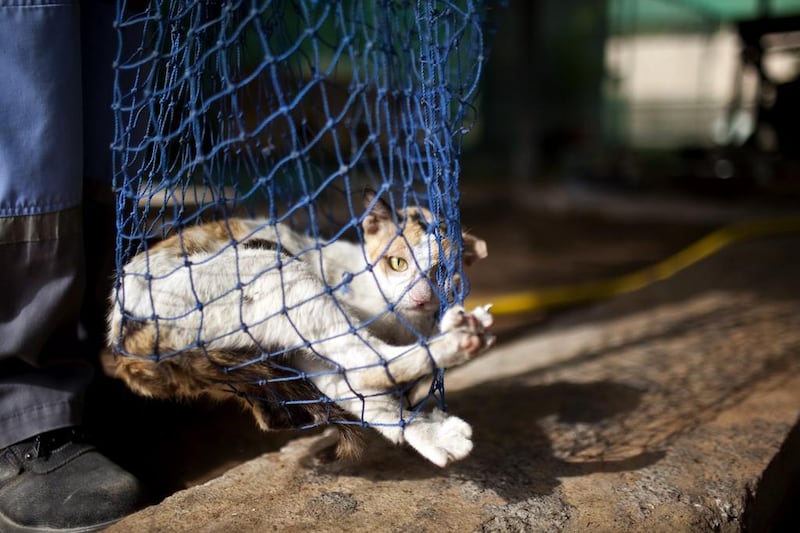DUBAI // Cat lovers and veterinarians have criticised a campaign against strays, saying it involves misleading information.
More than 300 cats were neutered after 3,284 complaints to the Dubai Municipality, which said this week that cases of toxoplasmosis in infected cats could lead to malformed human foetuses or pregnant women aborting.
It said a scratch from an infected animal could cause painful swelling and that cats could transmit rabies.
Cat lover Tracey Hughes said it was disappointing that misinformation was being used to stop people helping strays.
“You will not get toxoplasmosis just by being in the street or feeding a cat, and rabies has not been reported in the UAE for many years,” Ms Hughes said. “The chances of street cats transmitting it to a human is not applicable.”
Dr Dieter Malleczek, owner of the Blue Oasis Veterinary Clinic in Dubai Investments Park, said toxoplasma was caused by a parasite that needed 48 hours outside the cat’s body to become infectious.
He said that if a cat’s litter were cleaned every day there was no risk of transmission.
“Many people are immune because they have gone through infections earlier in their life, so if these people have antibodies they don’t have to worry at all,” he said.
“In the event there are no antibodies then a person has to be careful with raw or undercooked meat, unwashed fruit and vegetables and cheese from unpasteurised milk.”
Dr Malleczek said that anyone other than those whose immune systems were seriously compromised, such as people who were HIV-positive or those having chemotherapy, could easily be treated with antibiotics.
“Once the person is treated they will develop antibodies and therefore be immune to toxoplasma.”
He said that if test results indicated that pregnant women had toxoplasma antibodies, they did not have to be concerned.
“If the test result comes back negative then she would have to stay clear from eating raw or undercooked meat, unwashed fruits and vegetables, gardening and making sure cat litter was cleaned every 24 hours,” Dr Malleczek said.
And if someone were scratched by cat, it should be treated like any other wound.
“Think about if you were to cut your hand with a knife or fall on your knee, you should make sure that the wound is properly cleaned.”
Dr Hashim Al Awadhi, head of the veterinary section at Dubai Municipality, said the public should not be alarmed.
“Our priority is the health and safety of the public, and our intention is not to scare people,” Dr Al Awadhi said. “The first thing we do when we catch an animal is make sure it is free of serious diseases.
“If we find that it is extremely aggressive and is unable to be treated then we put it down mercifully. We will never put down an animal that is healthy and not dangerous. It goes against our religion and our morals.”
But Ms Hughes said that all cats, regardless of whether they were aggressive, should be trapped, neutered and returned.
“Trapping a street cat and taking it to a vet is extremely stressful for the cat and it may show fear-aggression,” she said. “It is very rare for a street cat to attack a human.
“Unfortunately, until bigger punishments and proper controls are put in place, people will continue to dump their pets on the street.”
Ms Hughes said responsible feeding of stray cats should be welcomed across the UAE, along with the neutering programme.
In 2012, Dubai Municipality introduced a Dh200 fine for people who fed stray animals.
dmoukhallati@thenational.ae





